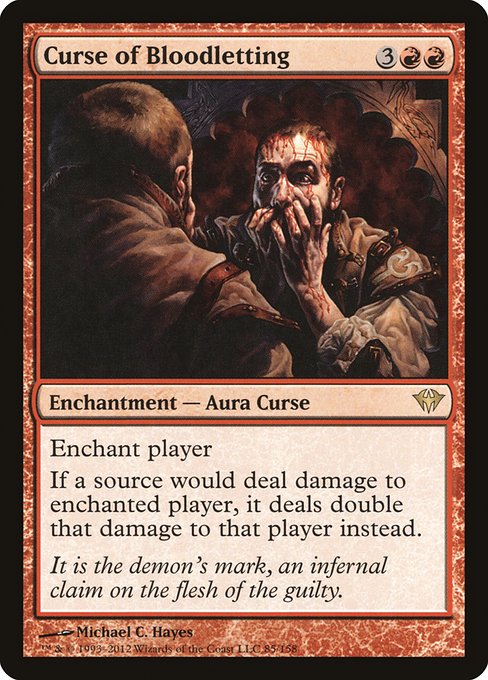standard
future
historic
gladiator
pioneer
explorer
modern
legacy
pauper
vintage
penny
commander
brawl
alchemy
paupercommander
duel
oldschool
premodern
Rulings
If multiple effects modify how damage will be dealt to the enchanted player, that player chooses the order to apply the effects. For example, Mending Hands says, “Prevent the next 4 damage that would be dealt to any target this turn.” Suppose a spell would deal 5 damage to enchanted player and that player has cast Mending Hands targeting themselves. The enchanted player can either (a) prevent 4 damage first and then let Curse of Bloodletting’s effect double the remaining 1 damage, taking 2 damage, or (b) double the damage to 10 and then prevent 4 damage, taking 6 damage.
The source of the damage doesn’t change. A spell that deals damage will specify the source of the damage, often the spell itself. An ability that deals damage will also specify the source of the damage, although the ability itself will never be that source. Often the source of the ability is also the source of the damage.
Curse of Bloodletting works with any damage, not just combat damage. It also doesn’t matter who controls the source of the damage that’s being dealt.
If more than one Curse of Bloodletting enchants the same player, damage dealt to that player will double for each one (two of them will end up multiplying the damage by four, three of them by eight, and four of them by sixteen).
The source of the damage doesn’t change. A spell that deals damage will specify the source of the damage, often the spell itself. An ability that deals damage will also specify the source of the damage, although the ability itself will never be that source. Often the source of the ability is also the source of the damage.
Curse of Bloodletting works with any damage, not just combat damage. It also doesn’t matter who controls the source of the damage that’s being dealt.
If more than one Curse of Bloodletting enchants the same player, damage dealt to that player will double for each one (two of them will end up multiplying the damage by four, three of them by eight, and four of them by sixteen).
Rulings
If multiple effects modify how damage will be dealt to the enchanted player, that player chooses the order to apply the effects. For example, Mending Hands says, “Prevent the next 4 damage that would be dealt to any target this turn.” Suppose a spell would deal 5 damage to enchanted player and that player has cast Mending Hands targeting themselves. The enchanted player can either (a) prevent 4 damage first and then let Curse of Bloodletting’s effect double the remaining 1 damage, taking 2 damage, or (b) double the damage to 10 and then prevent 4 damage, taking 6 damage.
The source of the damage doesn’t change. A spell that deals damage will specify the source of the damage, often the spell itself. An ability that deals damage will also specify the source of the damage, although the ability itself will never be that source. Often the source of the ability is also the source of the damage.
Curse of Bloodletting works with any damage, not just combat damage. It also doesn’t matter who controls the source of the damage that’s being dealt.
If more than one Curse of Bloodletting enchants the same player, damage dealt to that player will double for each one (two of them will end up multiplying the damage by four, three of them by eight, and four of them by sixteen).
The source of the damage doesn’t change. A spell that deals damage will specify the source of the damage, often the spell itself. An ability that deals damage will also specify the source of the damage, although the ability itself will never be that source. Often the source of the ability is also the source of the damage.
Curse of Bloodletting works with any damage, not just combat damage. It also doesn’t matter who controls the source of the damage that’s being dealt.
If more than one Curse of Bloodletting enchants the same player, damage dealt to that player will double for each one (two of them will end up multiplying the damage by four, three of them by eight, and four of them by sixteen).
Your collection? Your decks?
Want to manage your collection and/or create decks?


 0
0
 1.70€
1.70€